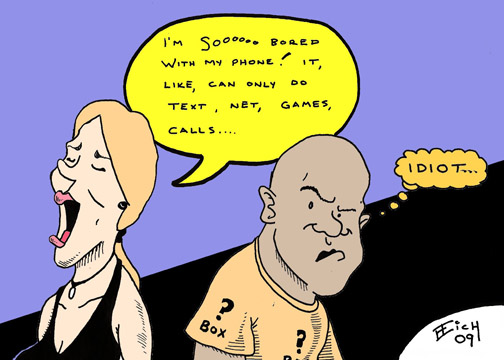Nowadays, if you are not wasting 99 cents texting KGB to ask for an answer to a ridiculous question, you are looking for the answer on Google, or some other preferred search engine.
The Internet is so common in North America about 74.1 percent use it, according to World Internet Statistics.
Because of such over saturation, we tend to take the Internet for granted, unlike most of Africa, where only 6.7 percent of the people are connected.
The information superhighway is about to pave into underserved, developing nations on a larger scale, though.
In rural Uganda, for instance, the nonprofit organization Question Box decided that if locals cannot get to the Internet, they would take the Internet to them. This small but brilliant organization employs a simple strategy.
Question Box workers — about 40 of them — spread throughout the countryside with cell phones.
Locals who lack access to a phone can ask the workers a logistical question. When the workers receive the question, they call another Question Box worker who has access to online databases.
Phone operators, the ones with the database, listen to the question and search for the answer. When they find the answer, they relay it to the worker with the cell phone and the answer is then shared with the original questioner.
Locals with their own cell phones, or landline phone access, can also call the phone operators with their questions, which typically range anywhere from agriculture to the best soccer teams.
Question Box is giving Ugandans something most Africans have been seeking for a long time — direct access to the outside world and a connection to resources. The project is not based solely in Africa. It was first launched in rural India, where an actual box in the center of the village allowed locals to “push to talk” with a Question Box worker.
Even in its simplicity, Question Box has intrinsic economic value. Information sharing technology could increase cell phone usage between locals in cases of emergencies. It could help local farmers and businesses with planting tips, stock information and weather conditions.
Question Box is backed by the Bill and Melinda Gates Foundation. Intel has contributed by extending its databases and Google is joining the cause, helping increase speed to the Internet connection in rural areas.
When Hillary Clinton toured Africa this summer, she met countless numbers of Africans in countries like Kenya, Ghana and Nigeria who requested that the United States cease giving direct aid to the “dark” continent. The opposition to U.S. aid claimed that most money given to African nations is recycled back into the hands of corrupt leaders and rarely lands in the hands of those who really need it.
Question Box, in an unexpected way, shows that economic freedom through access to information — not financial aid to thieves — is what Africa and other countries lacking information infrastrucure truly need in order to advance into the 21st century.
Projects like Question Box seem far removed from us because we have access to cell phones, the Internet, television and all other technology.
For that rural farmer who has traditionally relied on word of mouth for global news, shared information could level the playing — and planting — field.




